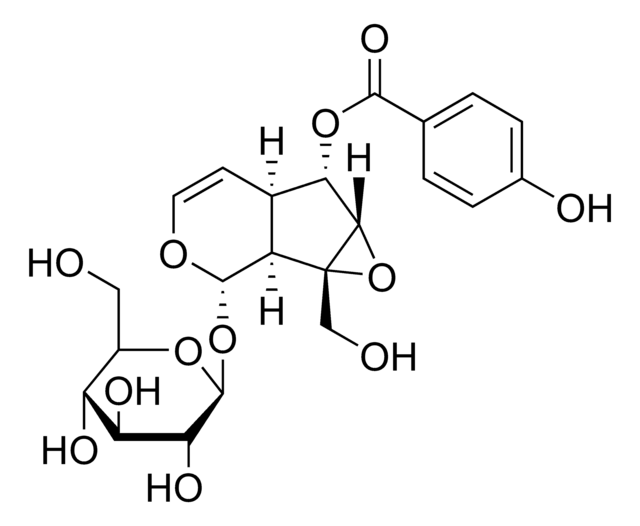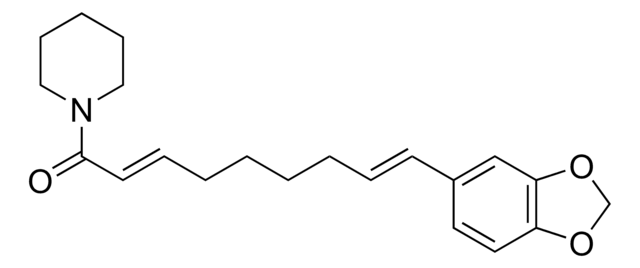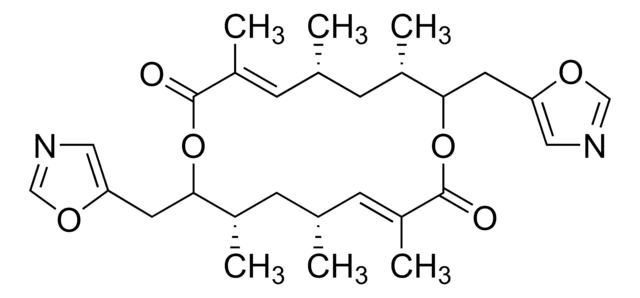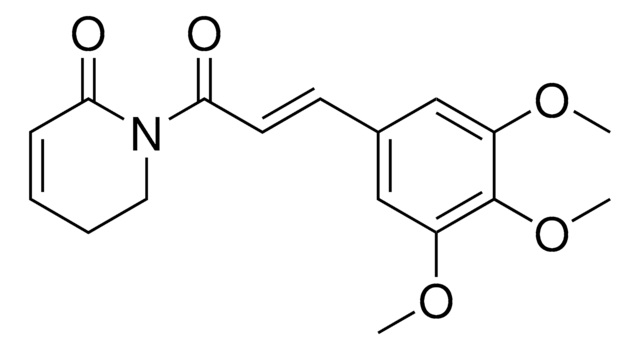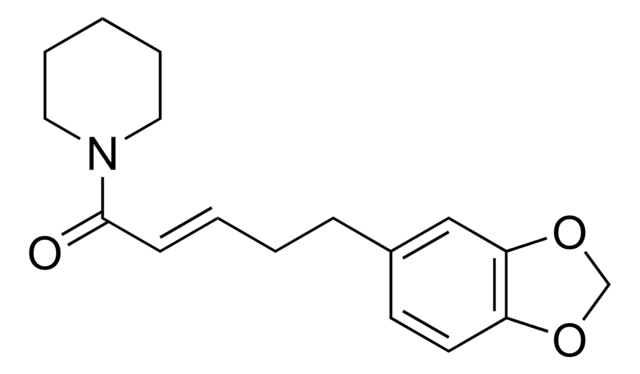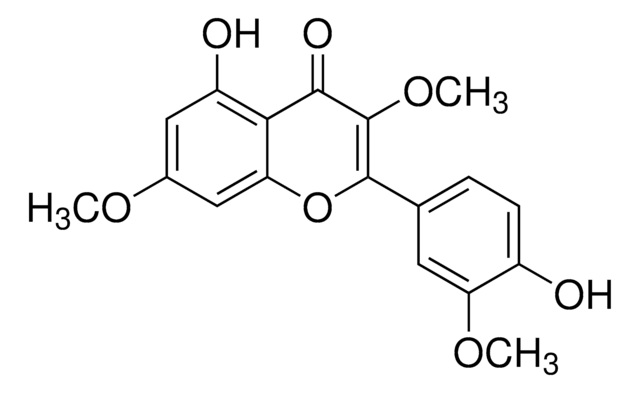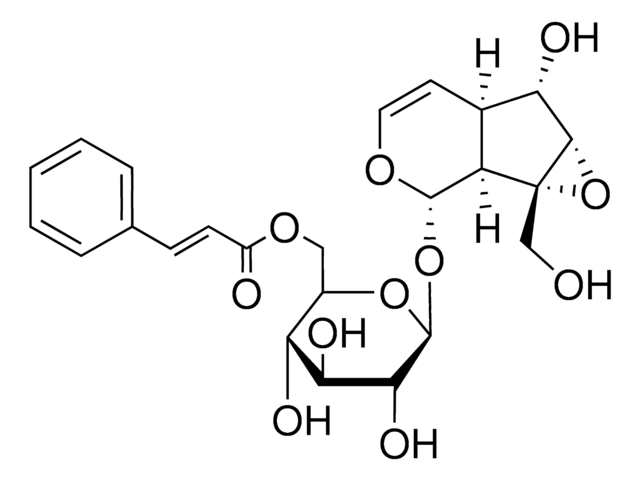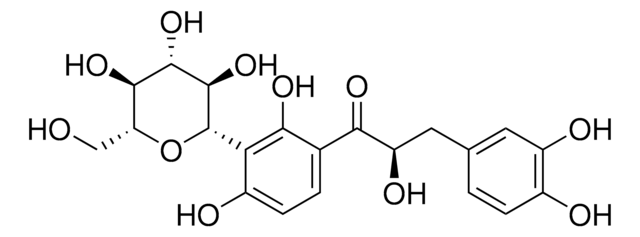SMB01055
Colladin
≥90% (LC/MS-ELSD)
Synonym(e):
Coladin
Anmeldenzur Ansicht organisationsspezifischer und vertraglich vereinbarter Preise
Alle Fotos(1)
About This Item
Empirische Formel (Hill-System):
C26H32O5
CAS-Nummer:
Molekulargewicht:
424.53
UNSPSC-Code:
12352205
NACRES:
NA.25
Empfohlene Produkte
Biologische Quelle
plant
Assay
≥90% (LC/MS-ELSD)
Form
solid
Mol-Gew.
424.53
Löslichkeit
water: slightly soluble
Anwendung(en)
metabolomics
vitamins, nutraceuticals, and natural products
Lagertemp.
−20°C
Verwandte Kategorien
Allgemeine Beschreibung
Colladin, a sesquiterpenoid coumarin, is a natural product commonly available from Ferula Sp. (F. arrigonii, F. vesceritensis, F. campestris and F. sinaica) plants. Existing research suggests that this plant-derived metabolite exerts various biological activities, including anticancer, neuroprotective, and antiglaucoma properties.
Anwendung
It is a natural product derived from plant source that finds application in compound screening libraries, metabolomics, phytochemical, and pharmaceutical research.
Biochem./physiol. Wirkung
According to the existing research, Coladin exhibited notable anti-cancer properties by substantially reducing cell proliferation and mitochondrial dehydrogenase activity in mouse B16F1 melanoma cells. These effects induced apoptosis through mechanisms involving decreased mitochondrial membrane potential and mitochondrial respiratory rate, underscoring its potential as a natural anti-cancer agent. Isolated from the roots of Ferulago campestris, coladin, along with other compounds such as umbelliprenin and epielmanticine, displayed inhibitory activity against Acetylcholinesterase (AChE) with an IC50 of 0.1 mM, suggesting its potential application in the treatment of neurological disorders like Alzheimer′s disease. Coladin, identified as one of the constituents in Heptaptera triquetra fruit, exhibited remarkable inhibitory activity against acetylcholinesterase (AChE), human carbonic anhydrase isoenzyme (hCA) I, and hCA II, with IC50 values of 8.25 nM, 28.90 nM, and 43.31 nM, respectively. This highlights its potential in the development of phytotherapeutics for conditions like Alzheimer′s disease (AD) and glaucoma.
Leistungsmerkmale und Vorteile
- High quality compound suitable for multiple research applications
- Compatible with HPLC and mass spectrometry techniques
Sonstige Hinweise
For additional information on our range of Biochemicals, please complete this form.
Lagerklassenschlüssel
11 - Combustible Solids
WGK
WGK 3
Flammpunkt (°F)
Not applicable
Flammpunkt (°C)
Not applicable
Analysenzertifikate (COA)
Suchen Sie nach Analysenzertifikate (COA), indem Sie die Lot-/Chargennummer des Produkts eingeben. Lot- und Chargennummern sind auf dem Produktetikett hinter den Wörtern ‘Lot’ oder ‘Batch’ (Lot oder Charge) zu finden.
Besitzen Sie dieses Produkt bereits?
In der Dokumentenbibliothek finden Sie die Dokumentation zu den Produkten, die Sie kürzlich erworben haben.
Sesquiterpene esters and sesquiterpene coumarin ethers from Ferula linkii-TF
Gonzalez A G, et al.
Phytochemistry, 33(4), 863-866 (1993)
Phytochemical content and enzyme inhibitory effect of Heptaptera triquetra (Vent.) Tutin fruit against acetylcholinesterase and carbonic anhydrase I and II isoenzymes
Kaya AC, et al.
Chemical Papers, 77, 5829?5837-5829?5837 (2023)
Cytotoxicity of sesquiterpenes ferulenol and coladin on liver FAO and B16F1 melanoma cells
Boulmeltout M, et al.
Pharmacognosy magazine, 14, 333-337 (2018)
Identification of non-alkaloid acetylcholinesterase inhibitors from Ferulago campestris (Besser) Grecescu (Apiaceae)
Dall'Acqua S, et al.
Fitoterapia, 81, 1208-1212 (2010)
Unser Team von Wissenschaftlern verfügt über Erfahrung in allen Forschungsbereichen einschließlich Life Science, Materialwissenschaften, chemischer Synthese, Chromatographie, Analytik und vielen mehr..
Setzen Sie sich mit dem technischen Dienst in Verbindung.